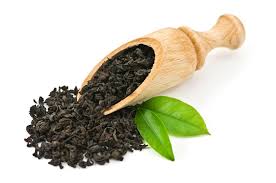Black tea is the most popular tea in North America and Britain. It is used in iced teas and popular blends such as "English Breakfast", "Irish Breakfast", and scented teas like "Earl Grey".
Black tea is traditionally steeped in boiling water until the pot runs dry! DON'T DO THIS, PLEASE!!!! You are missing out on the true aromas and flavours of this wonderful tea if you are simply pouring boiling water over your tea bags and leaving them sit until you drink it all up! Read on.
Black tea is a real tea made from the C. sinensis plant. It is produced in India, China, Sri Lanka and Africa and more. It's very flavourful and aromatic and does well with a touch of milk, honey, lemon, sugar or sweetener. It is the only tea that is fully oxidized.
Black tea is referred to as 'normal' tea in Britain and 'red tea' in China!
The processing of black tea can be quick: as quick as one day. The raw leaves are withered, then rolled by hand or machine. This begins the oxidation process. PLEASE NOTE: some sources mistakenly call this process 'fermentation'. It is NOT fermentation. Fermentation involves the action of micro-organisms. Pu-erh tea is fermented. Black tea is not. It is oxidized. (Heiss & Heiss)
If rolled, this is called the 'orthodox' method. Higher quality teas come from this method because the buds don't break. This can be done by hand or machine. The finest leaves are picked first for this method.
The CTC method, or Cut-Tear-Curl method is a sub-par method of processing tea, and it is used for tea in tea bags. The lower quality tea leaves are pressed through a roller with teeth, cutting and rolling the tea at the same time. This type of tea has great surface area, allowing a fast steep time. Certainly this is more convenient for a person on the run. CTC teas count for about 90% of the black teas produced in today's market, and much of Africa's teas go to this production.
After being rolled or put through the CTC method, the leaves are allowed to rest. This rest releases the enzymes that hold flavour and aroma. They are then dried in ovens, halting the oxidation method and sealing in those wonderful flavours and aromas!
Black teas should be steeped at just under boiling point, at about 96 degrees Celsius. They steep at the highest of all the teas. They should steep for about 3-5 minutes. THEY DO NOT STEEP WELL THE SECOND TIME since tannins have been released. (Although some sources, Cheadle and Kilby included, say black teas only contain tannin 'like' substances. Nonetheless, they all agree on a single steep.)
The liquor of black tea is a coppery, reddish brown. Steeped too long and it becomes astringent and you will have the 'puckery' feeling in your mouth. Black teas pair well with many foods, including meats, breads, chocolates and sweets! (Keating & Long)
The only tea that does NOT take milk well is the "champagne of teas", Darjeeling. This is a very unique black tea grown in the northeastern foothills of India, in the Himalayan Mountains. It is a pungent, crisp, muscatel tea. Steep at a lower temperature, between 80-90 degrees Celsius, and for only 3 minutes, and do not add milk. Heiss & Heiss recommend tasting the tea soon after steeping as the flavour may 'bolt'.
Some popular black teas:
ASSAM
- from NE India, the Assam Valley
- grows C. Sinensis var. assamica
- in most breakfast blends
- very strong tea
- can be processed both Orthodox and CTC
- CTC Assam that is famously British
CEYLON
- grown in Sri Lanka (previously named Ceylon)
- strong and tart
- aromatic
- teas here are classified by altitude
NILGIRI
- SE India, from the 'Blue Mountains' of Nilgiri
- brisk and fragrant
- often used in blends
YUNNAN
- SW China
- rich and peppery
- has been produced for over 1700 years!
BLENDED BLACK TEAS:
- ENGLISH BREAKFAST:
- has Assam in it
- takes milk and sugar well
- ironically developed in Scotland, but Queen Victoria loved it when she summered at Balmoral
- IRISH BREAKFAST
- has Assam and Ceylon
- hearty, tart
- is famously strong
There are many more types of black tea. My favourite is a scented black tea: EARL GREY!!! I have done a previous post on it. You can read it here.
The Tea Association of the USA says three or more cups of black tea a day can decrease your risk of heart disease and stroke! So enjoy your cuppa - guilt free! What's your favourite black tea?
Works Cited:
The Little Black Book of Tea - Heneberry
The Tea Book: All Things Tea - Cheadle and Kilby
The Tea Enthusiast's Handbook - Heiss & Heiss
How to Make Tea: The Science Behind The Leaf - Keating & Long










































